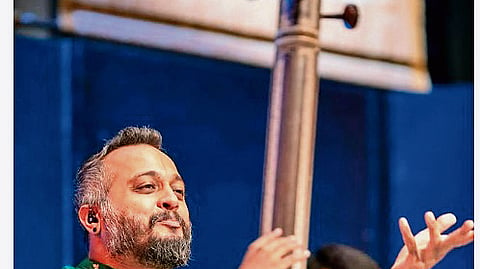

At 11, Sandeep Narayan took a flight from California to Chennai to learn Carnatic music. Such a decision was unheard of in the 90s. To explore his roots, Narayan left the lure of the West behind, and simply let music guide him home.
“I was born and raised in Los Angeles. I started learning music from my mother, Shubha Narayan. When I turned 11, my parents decided I should learn from a senior artiste in India, and I took a temporary break from school to move to Chennai and learnt from KS Krishnamurthy,” Narayan says.
That temporary break became three years, during that time Narayan learnt music from Krishnamurthy, which piqued his interest in Carnatic music.
After my guru passed away in 1999, I turned to his senior disciple Sanjay Subrahmanyan for a good 15 years or so. Because of my move to Chennai at 11 and subsequent visits during my high school and college years, the permanent move in 2006 was an easier transition,” says Narayan.
Narayan’s endeavours in Carnatic music have won him a nomination in South Asian Music Recording of the Year at this year’s Juno Awards in Vancouver. Arul, produced by Yanchan and sung by Narayan, offers a fresh twist to Carnatic music, blending Western production styles with traditional Indian classical influences, initiating debates among purists, and appealing to global audiences.
At the JUNO Awards, Arul will compete against music by heavyweights such as AP Dhillon, Chani Nattan, Inderpal Moga, Jazzy B, Jonita Gandhi, and Karan Aujla. Despite such steep competition, Arul stands out for its unique fusion of tradition and modernity.
The nomination hasn’t come as a surprise. “I grew up in a musical household. We always had music playing somewhere in the background. Sometimes my brother would be sitting for his music lessons. Sometimes my mother would be teaching music at home. Or my father would discuss music concerts. If we would travel by car, Carnatic music would play on the stereo. There was no such time when music wouldn’t surround us,” he says.
Narayan believes an artiste should take his/her craft beyond borders. “There is a strong following for Carnatic music in the West. My father was one of the earliest organisers of Carnatic music concerts in the US. He stared back in the 1980s. But that following and support is predominantly from the South Indian community,” he says.
The community has continued its support through generations. “What I am actively working on is the need to spread awareness about Carnatic music beyond our community. The first step is to pair up with the North Indian community and create wider exposure. Involving communities from non-Indian backgrounds in the US would also be a big step in that direction. Many of them think Indian music means Bollywood,” Narayan says.
And the future for Carnatic music, Narayan says, looks definitely bright. “For a brief spell, the youth were staying away from traditional forms of music in India. There was a strong affinity towards the West, and anything Indian was frowned upon. Now I feel Indian music is back, and many people in the West are realising there is something unique and amazing about Indian culture.”
Music brought Narayan home and now he wants to take it to the world.